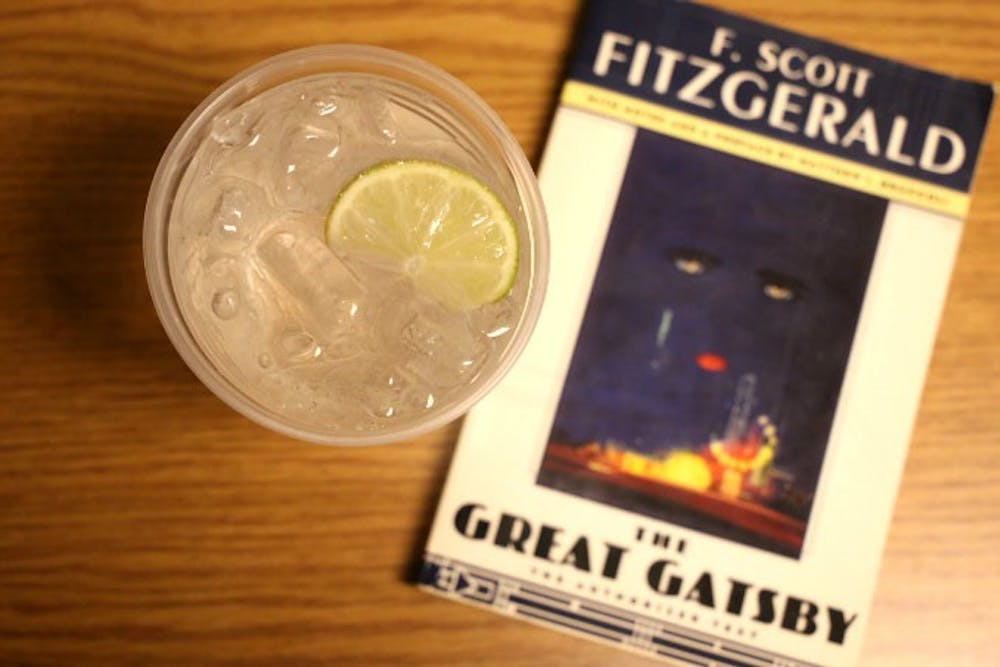Each week reporter Carson Abernethy drinks his way through great works of literature, reviewing books and the booze that inspired them.
F. Scott Fitzgerald’s "The Great Gatsby" is a masterful portrait of the booze soaked Jazz Age, contrasting the wealth and parties with the moral vacuousness and emptiness of the time. "Gatsby" is a complex allegory on the limitations, and by the end of the book, the disintegration of the American Dream.
Fitzgerald was a heavy drinker throughout his life, especially in the 1920s, a time that celebrated such addictions. Later works such as "Tender Is the Night" and "The Crack-Up" allow Fitzgerald to reflect poignantly on alcohol’s influence on his life.
Gin was reportedly Fitzgerald's spirit of choice, as he was sure it could not be smelled on his breath, and was the most prominent spirit of the decade. The Gin Rickey is featured in "The Great Gatsby," during a tense scene set on a hot day in the summer of 1922 when the main characters enjoy Gin Rickeys whilst the climax of the novel brews. It is a classic American cocktail. Enjoy on sweltering summer days, whether in a Long Island mansion or elsewhere.
Recipe:
- 2 oz. gin
- Half a lime, juice squeezed into glass
- Sparkling water
Squeeze half a lime over a highball glass filled with ice. Drop the lime in, and add 2 oz. gin. Fill the rest with club soda, garnish with lime slice.
"The Great Gatsby" recounts how Nick Carraway, a timid Midwesterner, finds his way to the fabulously wealthy village of West Egg in Long Island. He befriends a mysterious millionaire named Jay Gatsby, whose quest to win back a woman from his past, Daisy Buchanan, sets the novel in motion.
Prose: 5/5
Fitzgerald's writing in "Gatsby" is rich and intricate. The prose is a joy to read, and some of the greatest symbols in literature can be found in this novel: the green light at the end of Daisy's dock, just out of Gatsby's reach, the Valley of Ashes, the decaying valley separating West Egg from New York City and the all-seeing eyes of Doctor T.J. Eckleburg, the image on a billboard overlooking the Valley of Ashes. The novel's final few sentences remain some of the most powerful ever written, "Gatsby believed in the green light, the orgastic future that year by year recedes before us. It eluded us then, but that’s no matter — tomorrow we will run faster, stretch out our arms farther. ... And one fine morning — So we beat on, boats against the current, borne back ceaselessly into the past."
Characterization: 5/5
"The Great Gatsby" is brimming with interesting characters. Gatsby, the tragic central character in the novel, is a man who rises from humble origins to having everything but the girl he wants. Daisy Buchanan is the object of Gatsby's obsession, beautiful yet shallow, married to Tom, a racist millionaire resentful of Gatsby's connection with Daisy yet fostering affairs of his own. Both are referred to quite bitterly at the end of the novel by Carraway as careless people. "They smashed up things and creatures and then retreated back into their money or their vast carelessness or whatever it was that kept them together, and let other people clean up the mess they had made,” Fitzgerald wrote.
Cohesiveness: 5/5
The novel fits together very cohesively as a whole, and its brevity is one of its key strengths. Fitzgerald cut it down to just the essentials, where every word in it has to be there, everything is seamlessly connected. The novel's structure is calculated and precise, but it flows so well that it feels organic.
Relevance : 4.75/5
"Gatsby" is a cautionary tale about the excess of wealth, easily applicable to the age of "MTV Cribs" and "Keeping Up with the Kardashians," where worth and wealth are synonymous. It also cautions against idealizing. Gatsby's attempt to try and get back to some golden age reflects many of the feelings, and some of the political rhetoric, of today.
Overall: 5/5
"Gatsby," along with a handful of other books, is as close as novels gets to perfection. Beautifully written and vividly realized, it is easily one of the greatest works of American literature, and the benchmark for which all works since it should be judged. "The Great Gatsby" is the American Bible.
Related Links:
Books & Booze: 'The Sun Also Rises' by Ernest Hemingway
Books & Booze: 'On the Road' by Jack Kerouac
Reach the reporter at cabernet@asu.edu or follow @carson_ab on Twitter.
Like The State Press on Facebook and follow @statepress on Twitter.




